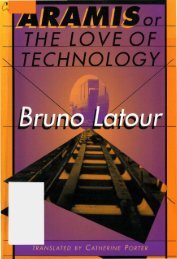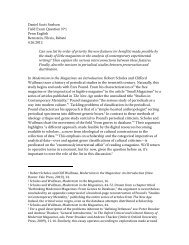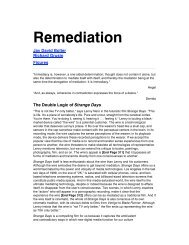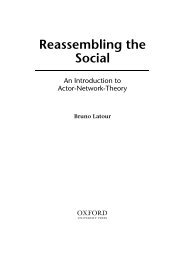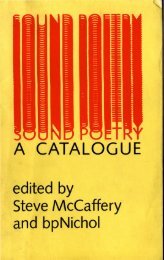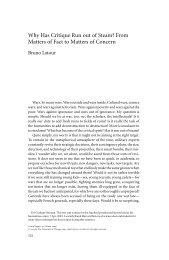The Exploit: A Theory of Networks - asounder
The Exploit: A Theory of Networks - asounder
The Exploit: A Theory of Networks - asounder
You also want an ePaper? Increase the reach of your titles
YUMPU automatically turns print PDFs into web optimized ePapers that Google loves.
8 Prolegomenon<br />
<strong>of</strong> power, but at the end <strong>of</strong> the day, it is the American president who<br />
makes decisions concerning war, resources, and trade. While this is<br />
undoubtedly true, it can also be argued that the political iconog -<br />
raphy <strong>of</strong> the presidency is the effect, not the cause, <strong>of</strong> asymmetrical<br />
global political relations. Furthermore, an effective political understanding<br />
<strong>of</strong> the situation cannot begin from the terminal effects <strong>of</strong><br />
power relations. Instead one might ask: what power relationships<br />
need to be in place such that a single entity can obtain propriety over<br />
global organization and control?<br />
While a Foucauldian emphasis on the bottom - up character <strong>of</strong> power<br />
relations is an important strategy for understanding the specifically<br />
global character <strong>of</strong> power relations, Foucault himself was always skeptical<br />
<strong>of</strong> contextualizing his work in terms <strong>of</strong> an ontology (and thus<br />
his emphasis on epistemology or on “power/ knowledge”).<br />
A Foucauldian analysis may reveal how power is conditioned in its terminal<br />
effects (Homeland Security, the Patriot Act), yet it does not say<br />
much on the existence as such <strong>of</strong> this power.<br />
Put simply, such an analysis describes how power comes to be, but<br />
says little about how it works or even that it exists as such. A number<br />
<strong>of</strong> questions follow from this: What does it mean to “personify” or<br />
to individuate entities such as the United States in terms <strong>of</strong> unilat -<br />
eralism? (This is Michael Hardt and Antonio Negri’s challenge as<br />
well, to argue that “America” and “Empire” are not mere synonyms.)<br />
More importantly, what are the networks <strong>of</strong> power relations that<br />
constitute the very ontology <strong>of</strong> the “unilateralism versus multilateralism”<br />
debate?<br />
One immediate answer is given by the myriad political analyses<br />
concerning the United States. 2 <strong>The</strong>se books hint at something intui -<br />
tive: that the very term “American unilateralism” is a misnomer. Unilateralism<br />
works at several layers: on one layer it connects the White<br />
House with the House <strong>of</strong> Saud, on another with Israel, on another<br />
with Halliburton, on another with the United Nations, and so forth.<br />
So while it might sound like a contradiction, the Foucauldian analysis<br />
suggests that unilateralism must be understood as a network. This<br />
does not mean that it has no center; quite the opposite.



